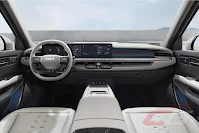Kia’s commitment to become a leader in sustainable mobility will be extending beyond zero-emission EV drivetrains. The Korean automaker has declared a roadmap to reduce its overall carbon emissions by 7 percent by 2030 compared to 2019 figures, 70 percent by 2045, and full carbon neutrality by 2045.
With that in mind, Kia is re-thinking the manufacture of its vehicles from the ground up, particularly when it comes to the materials used in its construction.
With the EV6, Kia has already used recycled plastics and materials made from flaxseed extract. Continuing with EV9, Kia is embracing a three-step Design Sustainability Strategy. Initiated to phase out the use of leather—a material that’s nearly 7 times more impactful to the climate compared to man-made materials—it continues with the use of bio-based materials such as corn, sugar cane, and natural oils. In fact, it’s Kia’s target to increase the proportion of recycled plastics it uses to 20 percent by 2030.
Kia’s decision to use sustainable materials in the construction of the EV9 goes well with their Opposites United design strategy which takes inspiration from the contrasts found in nature and humanity.
At the center of the design philosophy is a new visual identity evoking positive forces and natural energy, with contrasting combinations of sharp stylistic elements and sculptural shapes. ‘Opposites United’ is based on five key design principles: ‘Bold for Nature’, ‘Joy for Reason’, ‘Power to Progress’, ‘Technology for Life’, and ‘Tension for Serenity’.
Design aside, even the EV9’s color palette draws inspiration from nature’s four core elements: light, air, earth, and water to closely establish its connection with nature.
Interior materials aside, Kia will also look at its entire production process to cut carbon emissions wherever it can. They are mandating their supply chain in the production of key components such as steel, non-ferrous metals, and batteries. The carmaker is also targeting to use 100 percent renewable energy in vehicle production globally by 2030 (2040 in Korea).









No comments:
Post a Comment
Feel free to comment or share your views. Comments that are derogatory and/or spam will not be tolerated. We reserve the right to moderate and/or remove comments.